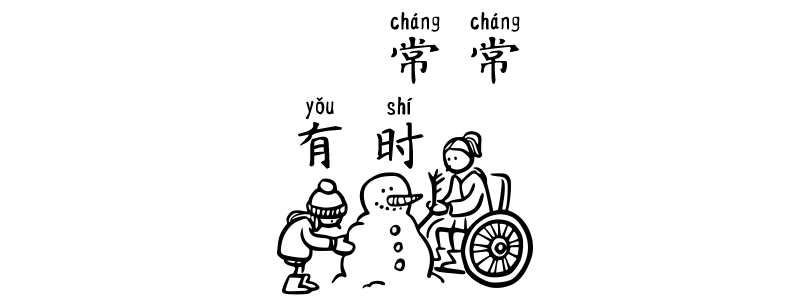Grammar Point:
To express the frequency adverbs “usually” and “sometimes” in Chinese, we use the terms 常常 chángcháng and 有时 yǒushí.
Structure
S + 常常 chángcháng + VO
常常 chángcháng (often, usually) refers to a behavior or action that occurs frequently and with short intervals between occurrences. Therefore, it cannot be used in the negative form. Also, unlike in English, frequency adverbs in Chinese are typically not placed at the end of sentences.
我常常覺得他很笨我常常觉得他很笨
I often think he is dumb.
你常常在上課的時候睡覺嗎?你常常在上课的时候睡觉吗?
Do you often sleep during class?
我常常忘記新朋友的名字我常常忘记新朋友的名字
I often forget new friends’ names.
老師常常拉肚子老师常常拉肚子
The teacher often has diarrhea.
FYI
I understand that many foreigners may encounter stomach issues when in China or Taiwan due to differences in food. However, when it comes to explaining your condition to a doctor, colleagues, or friends, it’s best to steer clear of using medical terminology like 腹泻 fùxiè for “diarrhea” as found in dictionaries. Instead, a more casual and commonly used term is 拉肚子 lādùzi, which means “having diarrhea.”
Now, here’s another cultural aspect to consider. Is it considered oversharing to inform friends, teachers, or colleagues about your bout of diarrhea? In Chinese culture, it’s actually perfectly acceptable and even encouraged. By letting people know about your situation, they can offer assistance and show their concern.
S + 常 cháng + VO
常 cháng indicates that a behavior occurs more than once; it can also mean ordinary, common, or long-lasting. Therefore, it can be used in the negative form.
我常在早上喝一杯咖啡我常在早上喝一杯咖啡
I often have a cup of coffee in the morning.
我的狗常在我的腳上睡覺我的狗常在我的脚上睡觉
My dog often sleeps on my feet.
她不常吃早飯她不常吃早饭
She doesn’t often eat breakfast.
你常練習中文嗎?你常练习中文吗?
Do you often practice Chinese?
S + 有时 yǒushí + VO
有时 yǒushí means “sometimes” or “at times” in Chinese. It indicates that something occurs occasionally or intermittently. It cannot be used in the negative form, and it is also uncommon to use it in a question form.
他有時晚上上課他有时晚上上课
He sometimes has evening classes.
我有時覺得做人很累我有时觉得做人很累
Sometimes I feel tired of living.
貓很可愛,但是有時真的很奇怪猫很可爱,但是有时真的很奇怪
Cats are cute, but sometimes they can be really strange.
有時我喜歡看電影,有時我喜歡看書有时我喜欢看电影,有时我喜欢看书
Sometimes I like to watch movies, and other times I like to read books.
Practice
TouchHover over the space to see the answers.
✔️ In Taiwan, I don’t often speak English.
在台灣我不常說英文在台湾我不常说英文
✔️ In Canada, I frequently speak English.
在加拿大我常常說英文在加拿大我常常说英文
✔️ At Chinese restaurants in Canada, I sometimes speak Chinese.
在加拿大的中國餐廳,我有時說中文在加拿大的中国餐厅,我有时说中文


